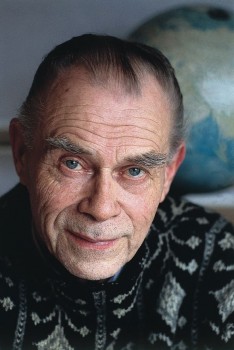Out of the body
13 January 2011 | Reviews

Veikko Huovinen. Photo: Irmeli Jung
‘Where will you be spending your eternity?’ ‘A spot of transmigration’, a short story by Veikko Huovinen (1927–2009), immediately confronts its main character, a man named Leevi Sytky, with this ultimate question.
Behind it is the sense of sin and fear of damnation typical of the religious life of northern Finland. Anyone who has made it as far as this final short story of Huovinen’s 1973 collection, Rasvamaksa (‘Fatty liver’) will, however, not make the mistake of taking the question too seriously; something diverting is clearly once again on offer.
Soon Leevi Sytky takes his leave of life in slightly sinful circumstances, but in the hereafter it turns out that these are not looked upon with disapproval.
Huovinen, living in Sotkamo in north-eastern Finland, was a forester before becoming a full-time writer, and in his depictions of the ordinary people of northern Finland he makes God, too, into a kind of lumber-camp caption, with the broad world-view of the lumberjack. All sorts of ways of spending eternity are on offer, and Leevi Sytky decides to try transmigration.
Like his popular novels about the highly original wilderness philosopher Konsta Pylkkänen and his novel Hamsterit (‘Hamsters’, 1957), ‘A spot of transmigration’ represents the warm satire of Huovinen’s work, in which people dedicate themselves to indulging their instincts for collecting and enjoyment. These much-loved characters have also found themselves on the movie screen. But Huovinen’s extensive oeuvre also includes sharper tones. A particular butt of Huovinen’s satire was militarism, as in his novels Rauhanpiippu (‘Peace pipe’, 1956) and Veitikka (‘Rascal’, 1971), of which the latter is a parodic biography of Adolf Hitler. In the name of equality, Joseph Stalin also received his ‘biography’, Joe-setä (‘Uncle Joe’), in 1988.
Leevi Sytky experiences the joys and sorrows of existence as many different animals: crow, burbot, ‘dawg’. The human soul in an animal’s body is a traditional subject of satire, generally used to demonstrate how harshly human beings treat those weaker than themselves. Huovinen, however, has more positive aims. Dominant among them is the experience of the power and freedom of the body, which can be enjoyed without the responsibility implied by human life.
The longing for irresponsibility is also expressed by a short visit to the body of the director of the local Alko liquor store, and the theme reaches its climax when, at the end, Leevi Sytky becomes a crane. As a migratory bird that can, when autumn comes, set out for warmer countries while humans stay behind to await the coming of winter, the crane has often been used in Finnish poetry to represent freedom.
Huovinen was also an early embracer of environmental questions in his work, for example Ympäristöministeri ‘Minister for the environment’, 1982) – although his satire is directed equally at idealistic environmentalists and destroyers of nature. Indeed, Huovinen’s satire is extremely ambiguous and challenging. He often plays with highly sensitive subjects; his Hitler becomes a rascal, who implements genocide and destroys Europe on a whim, laughing at human stupidity. In this respect Huovinen’s Hitler is, indeed, a kind of alter ego of his creator.
The question of political correctness in Huovinen’s work is beside the point; the central element of his philosophy as a writer is to be able to laugh at everything. Huovinen is, indeed, hilariously funny, but at the same time he is a lyrical and intelligent writer whose themes are not wearied by age.
Translated by Hildi Hawkins
Veikko Huovinen’s books have been translated into 12 languages. (For details, see the database here.)
Tags: classics, satire, short story
No comments for this entry yet
